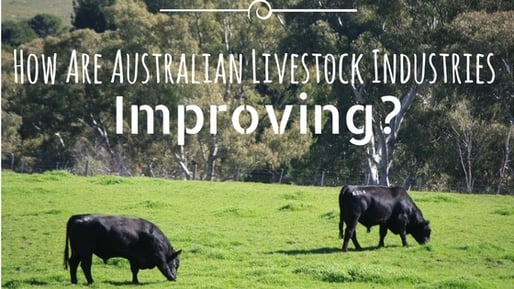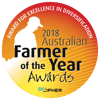 Livestock industries have made huge contributions in initiatives to improve the efficiency and effectiveness of everyday activities. As well as reducing the overall impact of practices on the environment.
Livestock industries have made huge contributions in initiatives to improve the efficiency and effectiveness of everyday activities. As well as reducing the overall impact of practices on the environment.
In particular, producers and regulatory bodies within the red meat industry are committed to improving the standards, guidelines and regulations that guide the secor.
We love this and thought that we would take the opportunity to share some of the great developments within the sector.
Animal welfare standards:
The handling and care of livestock is a top priority for Australian producers. They are all aware of their roles and responsibilities for the welfare of the animals they care for.
As a result, the Australian red meat industry has become an international leader in the development of the industry. This has also resulted in a higher quality and competitive product on the world's stage. (MLA)
The Worlds Best Steak competition held this year in London.
The world's best steak title was was taken out by Jacks Creek from Australia with their 450 day grain fed F2+ Wagyu beef. Also, Australia’s Australian Agricultural Company, JBS Global received Gold.
Teys Australia Pty Ltd won Silver with their beef supplied by Princess Royal Feedlot. Zandbergen World’s Finest Meat and Signature Beef – “Oino Gustus” also won silver.
Jan Zandbergen b.v., JBS Global Tajima brand and Thomas Foods International received Bronze medals at the competition.
9 out of the 31 place getters were Australian.
This is further evidence to support the high standard and quality of home grown Australian beef. Click here the read about The Worlds Best Steak Competition.

There are various standards and regulations in place to continue the positive progress in the industry. These include;
State animal welfare acts and regulations.
Every state in Australia has their own animal welfare regulations that ensure that producers are doing the right thing by livestock at a state level.
Meat and Livestock Australia
Meat and Livestock Australia (MLA) deliver research, development and marketing for Australian cattle, sheep and goat producers. MLA work with both producers and the Australian Government to ensure that Australian producers can progress, achieve a higher level of sustainability and become even more competitive on the international stage.
MLA have produced an extensive animal welfare program that focuses on livestock production and livestock care. Helping to ensure that livestock management, handling, transport and product quality remain one of the highest in the world.
The Department of Agriculture and Water Resources On-Farm Codes of Practice.
The Australian Government have developed various standards for the care and production of livestock, including the sourcing, preparation and transport of livestock within the live export industry. The code’s of practice are free and publicly available. This is to ensure that every producer is aware of their roles and responsibilities in their respective industries. It also assists in ensuring the long-term protection of Animal Welfare Standards.
The National Feedlot Accreditation Scheme
The Australian feedlot industry is highly regulated and the National Feedlot Accreditation Scheme (NFAS) regulates the processes of Australian feedlots. The NFAS guarantees that livestock held in an Australian feedlot are well treated with the highest standard of care. The NFAS regulates daily monitoring, feed, water, monitoring heat stress and proper treatment of sick, ill or injured livestock. Feedlots are regularly audited to make certain that all operations are compliant with national standards.
Transportation
Transporting livestock can result in high-stress levels if not conducted properly. This is why a national guide, standards and regulations were put into place to ensure the safe and efficient loading, transport and unloading of livestock. MLA have also produced a code of practice to ensure that the guidelines around the transport of livestock are met.
MLA and LiveCorp have also produced a joint initiative to assist in the animal welfare standard of the transport of livestock in overseas livestock in international countries.

Target 100 are doing a great job at promoting various initiatives aimed at improving the sustainability of Australian sheep and cattle farming.
They have developed 100 initiatives to deliver improvements to the environment and practices of producers. Some of these initiatives that have been achieved include;
- Boosting livestock production efficiency by reducing GHG emissions from livestock,
- Understanding how a by-product from winemaking can reduce livestock emissions,
- Adapting to climate variability,
- Seeking a cattle tick vaccine,
- Reducing methane emissions from Australian cattle and sheep,
- Studying the impact of forage plantations on greenhouse gas emissions
Target 100 have also done a lot more to ensure the sustainability of Australian cattle and sheep production and share some wonderful and inspirational stories. They also do a fantastic job in promoting the achievements of the industry.
Learn more about Target100 here
Australian agricultural and primary production industries make progress every year in, sustainability, effectiveness and efficiency of everyday processes. Together with dedication and hard work we will be able to ensure the long-term sustainability and reduce our environmental harm securing the longevity and success of Australian production.


